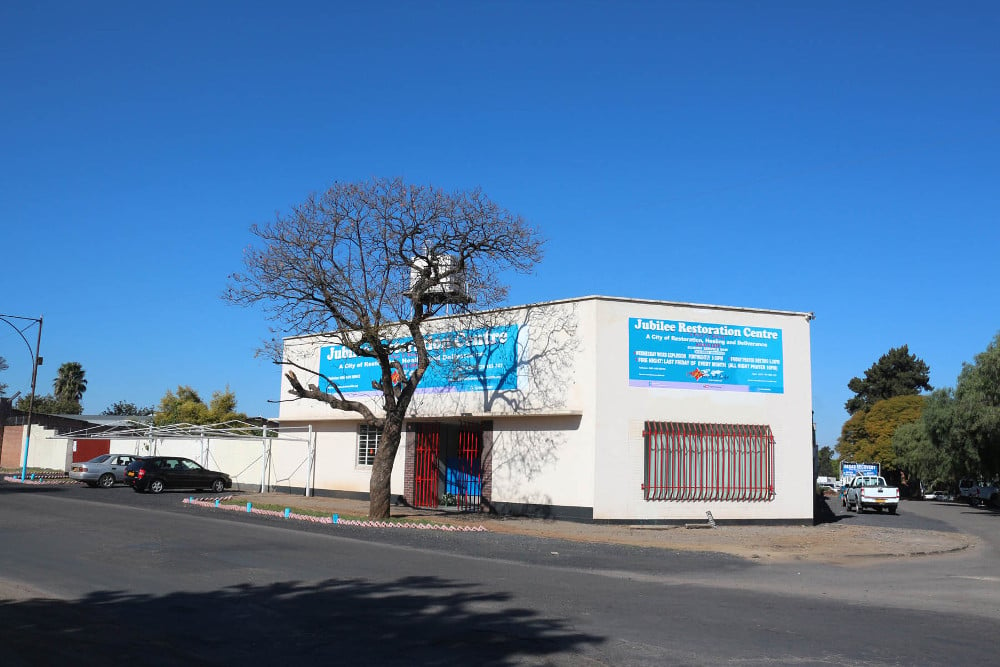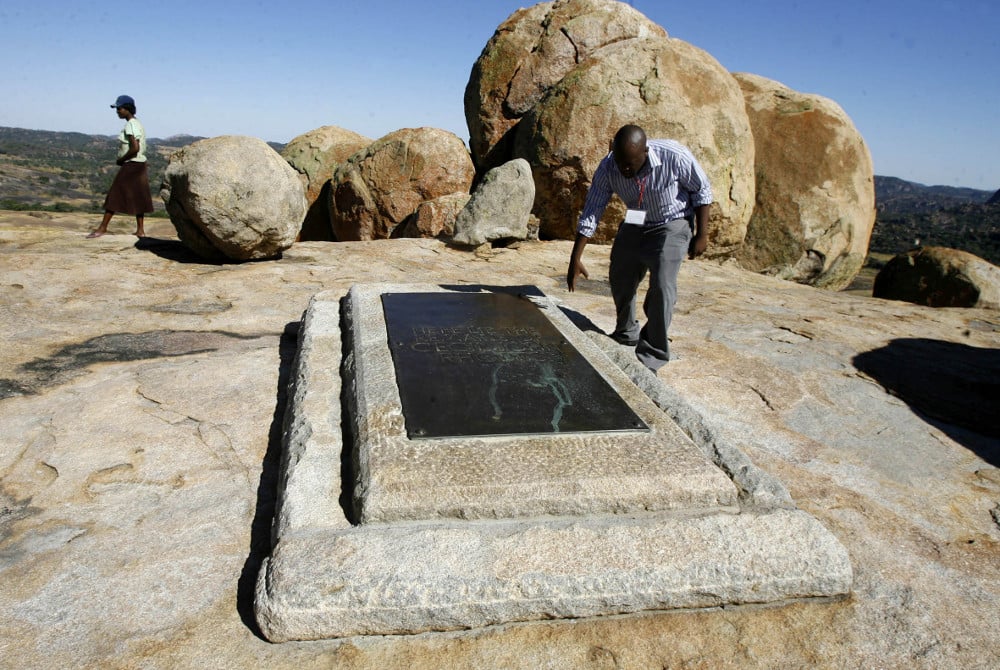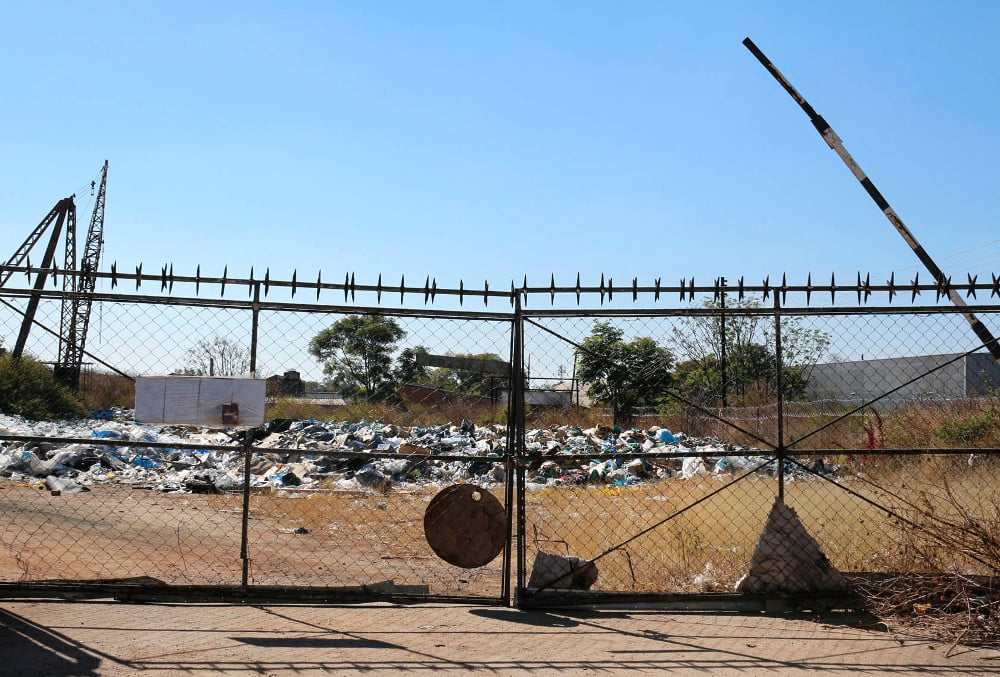Tough times: Bulawayo has become a shadow of its former bustling self.
Bulawayo, also known as the City of Kings because of its rich past as the home of the ancient Rozvi, Torwa and Ndebele kingdoms, is no longer a place fit for a king.
This year the city commemorates 120 years of its founding by the British arch-imperialist Cecil John Rhodes in 1894 – but its former glory has faded considerably.
The vitality and exuberance of its citizenry has long been sucked out by years of industrial decline, resulting in crippling unemployment and poverty for its residents.
Also known as KoNtuthu ziya–thunqa (Ndebele for “a place that continually exudes smoke”), Bulawayo was for years Zimbabwe’s industrial hub and boasted a number of large manufacturing and engineering companies. These included the Tregers Group, Zimbabwe Engineering Company, Hubert Davies, Merlin Textiles, Stewarts & Lloyds, Build Elect, Dunlop, Hunyani Holdings and G&D Shoes, among others. But the smoke from Bulawayo’s industries has died down over the years.

Salvation calls: This former factory in the Belmont industrial area has been converted into a Pentecostal church.
(Emmanuel Ben)
Because of its industries and its strategic proximity to South Africa and Botswana, as well as being the nearest city to the country’s prime tourist destination, Victoria Falls, Bulawayo was also a transport hub, with the National Railways of Zimbabwe headquartered there.
Although the massive economic problems Zimbabwe is grappling with are not unique to Bulawayo, it is probably the country’s hardest-hit city. It has seen countless company closures and downsizings. Many people have relocated their businesses to Harare, leaving the once productive industrial areas of Belmont and Donnington bereft.
A drop in the ocean
Sadly, fixing Bulawayo’s woes appears to be beyond the government’s capabilities. A government attempt in partnership with Old Mutual to make $40-million available in 2011 under the Distressed Industries and Marginalised Areas Fund to help companies to retool proved to be nothing more than a drop in the ocean.
In March, the industry and commerce minister, Mike Bimha, said: “The resources were limited and could not meet industry’s requirements, as they were far below the $2-billion that was required then – a figure which has since risen to $8-billion.”
Eddie Cross, a Bulawayo Movement for Democratic Change MP and an economic adviser to opposition leader Morgan Tsvangirai, paints a bleak picture of the city’s prospects.
“I see no improvement at all due to company closures in the main pillars of Bulawayo’s industries of mining, railway transport and textiles,” he tells the Mail & Guardian. “Railways are operating at 10% capacity and staff have not been paid for 12 months.
“You have a complex set of factors ranging from the general economic collapse … which was made worse for companies by the fact that, when the country moved to dollarisation in 2009, whole savings were wiped out and they had to start afresh.
“It is a huge challenge to recapitalise and it is only those companies with external links that have been able to stay afloat.”
A visit to the Belmont industrial area, once alive with the roar of engines and the wail of railway locomotives transporting finished goods, reveals the story of decay. A significant number of factories have been turned into shops and warehouses for imported goods manufactured elsewhere – mostly from South Africa.

Rhodes to ruin: Arch-imperialist Cecil John Rhodes is buried in the Matapos hills on the outskirts of the city. (AFP)
The streets are generally deserted and the few remaining workers can afford to take prolonged afternoon siestas on the railway line that snakes through the industrial belt, sleeping safe in the knowledge that trains in the area are now a thing of the past. The long grass on the tracks is ample evidence that the trains have long ceased to operate.
Even the Bulawayo Power Station along Railway Avenue is subdued, as only one of its five towers sends occasional puffs of smoke into the air: power generation is either taking place at a very slow pace or not at all.
A statue of Rhodes, which used to look proudly at his achievements from Main Street in the heart of the city, has been replaced with one of Joshua Nkomo, an iconic founding father of Zimbabwe. It is one of the only new landmarks in the once bustling and prosperous city.
The city centre hides its decay with the resplendent purple blooms of jacaranda trees that line the spacious streets.
Residents stop every now and then to gaze at the huge framed images of Kings Mzilikazi and Lobengula that adorn the perfectly manicured lawns at the council-owned town house and revenue hall. The images were put up as part of the city’s 120th anniversary celebrations.
But the images mean nothing to 27-year-old Mxolisi Sibanda, who touts for customers seeking to travel to South Africa from the popular Max Garage just across the road from the Bulawayo city council offices.
A statue will not solve it
“Lobengula and Mzilikazi are not going to bring food to the table. Neither will the solution come from erecting a statue of Nkomo. The politicians ought to be investing their time, energy and resources in finding solutions to the deindustrialisation that continues to suck the life from this city,” he says with the self-assuredness that characterises Zimbabwe’s well-educated but unemployed young people.
But it is not just the young who are disillusioned with the state of the city. “The industries have shut down and no more will you hear the sounds of factory engines or see haulage trucks moving some newly manufactured goods,” says 57-year old Richard Nqadini, a retired train driver who has lived in the city all his life. Companies are closing down every week, people are losing jobs and the politicians are clueless.”
Even President Robert Mugabe has admitted to the magnitude of the problem. “Our cities are dying. Bulawayo was once a thriving industrial hub … but it has become a sorry industrial scrapyard,” he said during his inauguration in Harare last year.
Mugabe outlined an ambitious economic blueprint at the ceremony – the Zimbabwe Agenda for Socio-Economic Transformation – which promises, among other things, to bring water to Bulawayo from the Zambezi River by 2018 to end the city’s water woes – a factor that has been partly blamed for the decay of its industry.

PMM Plastics, a major plastic recycling plant in Bulawayo, has shut down its operation in Donnington.
(Emmanuel Ben)
But Dumisani Nkomo, a member of the Matabeleland Civil Society Forum, says it is highly unlikely that the government will complete the project by 2018, given its poor record of delivery in Matabeleland.
“They will continue talking, but there is never any delivery. They [government] should come clean about the deal they signed with the Chinese,” says Nkomo.
The overriding sentiment in the city is that the Shona-dominated central government has been strategically marginalising the mainly Ndebele-populated city for years to force companies to relocate to other provinces.
This is a view shared by Sam Ncube, a founder member of the Affirmative Action Group (AAG). Ncube says it is time the people of Bulawayo revived their city, otherwise they will continue to suffer at the hands of politicians.
“The political leadership are the worst culprits,” Ncube tells the M&G. “They only think of winning votes, not development.
“Since 2009, we have been organising indabas to look for solutions … but there is a palpable lack of self-confidence among Bulawayo’s people. If they do not wake up to the challenges they will continue to fall victim to people from Harare who come in to buy companies and properties for a song.”
Ironically, the AAG’s founding president, Philip Chiyangwa, who is Mugabe’s nephew, presided over the collapse of two major manufacturing companies in the city – G&D Shoes and Zeco – which once employed 2 000 workers, but now only employ about 50.
Hostile policies
Roderick Fayayo of the Bulawayo Progressive Residents Association says the government’s policies are hostile to potential investors as no sane person will risk having their business summarily expropriated under the guise of indigenisation.
“Residents are suffering as a result of the high unemployment and we believe this is part of a deliberate political decision to cling to power by emasculating the labour movement,” he says.
Fayayo accuses Zanu-PF politicians of buying companies to achieve total control of labour. “We have done our best to articulate these issues but we are talking to a government which is not concerned at all,” he says.
The politicians, however, say they are doing what they can. Zanu-PF national chairperson Simon Khaya Moyo, who is tipped to become the country’s second vice-president, says he is doing his best to address Bulawayo’s challenges as one of the senior politicians from that region.
“I am bringing the ministers in in batches … to explain to them and to the residents what it is that they will be doing to implement development programmes in the region. “I will be bringing ministers from the economic cluster and this will end with those from the social services cluster. These briefings will enable people of the region to follow up on development programmes.”
But this is all talk and there has been plenty of it over the years without any meaningful action to halt the decline.
The MDC’s Cross says: “The principal problem is that of recapitalisation. We need billions of dollars to recapitalise, but the money is just not available. The major challenge is for Zimbabwean and Bulawayo companies, in particular, to access cheap money.
“They need to be able to borrow on the same terms that American, British and even Chinese companies are borrowing [which charge an average of 3% interest on loan repayments] yet they cannot do so because of the … risk associated with Zimbabwe, perhaps unfairly so.”
Cross says local banks will give short-term loans at more than 20% interest but that this is too expensive and unsustainable for local businesses. The majority of companies that have survived in Bulawayo are those with external links, such as holding companies in other countries.
Cheaper imports
“The likes of [supermarket retail chain] TM, Delta [Beverages] and Datlabs are some of the few companies that have remained viable and that is only because of external funding support from South Africa,” Cross says, adding that some industries can no longer be revived, especially those in textile and footwear, because of competition from cheaper imports.
The challenge, he says, is to focus attention and resources on reviving viable industries or to establish those that could give the country a competitive edge, such as support industries for the mining and transport sectors.
Acting Bulawayo mayor Gift Banda is concerned about the scale of the problems facing the city. “There is a policy of centralising everything in this country and, as a result, you see companies closing in Bulawayo only to reopen in Harare.” In desperation the council is trying various incentives to attract investors, including offering tax rebates to potential investors.
“We have so many opportunities in the tourism sector, in our nature reserves and even in the construction of low-cost housing,” Banda says. “We are saying investors can partner us in return for tax rebates. They will not have to pay us anything while they are setting up and they will only do so when they are fully operational.”
For now, however, there is precious little for the once prosperous city to celebrate at 120 years.